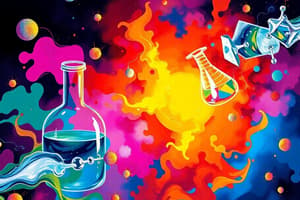Podcast
Questions and Answers
What is the main focus of Chemistry as a discipline?
What is the main focus of Chemistry as a discipline?
- Studying the properties of energy
- Exploring the behavior of light waves
- Understanding the behavior of cells
- Investigating chemical processes in elements and compounds (correct)
Which of the following is NOT mentioned as an example of common chemical experimentation?
Which of the following is NOT mentioned as an example of common chemical experimentation?
- Building robots (correct)
- Burning things
- Making soap
- Growing crystals
What allows scientists to accurately measure the concentrations of specific elements present in a sample?
What allows scientists to accurately measure the concentrations of specific elements present in a sample?
- Atomic spectroscopy (correct)
- Microscopy
- Laser technology
- Thermodynamics
Which field focuses on understanding the behaviors of atoms and molecules?
Which field focuses on understanding the behaviors of atoms and molecules?
What do chemists study when they explore how different materials combine together?
What do chemists study when they explore how different materials combine together?
What is the primary goal of manipulating atoms and molecules in Chemistry?
What is the primary goal of manipulating atoms and molecules in Chemistry?
What is the main goal of chemistry?
What is the main goal of chemistry?
How does analytical chemistry help us in relation to chemical reactions?
How does analytical chemistry help us in relation to chemical reactions?
What do chemists aim to achieve through careful observation and controlled experiments?
What do chemists aim to achieve through careful observation and controlled experiments?
What does analytical chemistry help us determine about chemical samples?
What does analytical chemistry help us determine about chemical samples?
How does chemistry contribute to innovation across diverse industries?
How does chemistry contribute to innovation across diverse industries?
Study Notes
Physical Science is a broad field of study encompassing various disciplines focused on understanding the fundamental properties and behavior of matter, energy, and their interactions. One such discipline within this realm is Chemistry, which deals with the composition, structure, properties, and reactions of elements and compounds.
Chemists investigate chemical processes occurring in pure substances as well as physical mixtures like solutions and alloys. They explore the changes that occur when different materials combine together, studying how these substances interact with each other and what new products can result from these combinations. Some common examples of these types of experimentation include burning things, making soap, baking cookies, growing crystals, extracting metals from ores, preparing food, and synthesizing pharmaceuticals. In essence, chemists focus on understanding the behaviors of atoms and molecules, allowing us to manipulate them to achieve specific results, whether it's creating new medicines, developing stronger materials, or improving our cooking techniques.
The field of chemistry also involves identifying individual elements through a process called atomic spectroscopy. This technique allows scientists to accurately measure the concentrations of specific elements present in a sample by analyzing its absorption spectrum, effectively revealing how much of a substance there is in something else. Additionally, through the research conducted in the area of analytical chemistry, we can determine if any two chemicals react completely with each other. By combining two chemicals, they form one single compound. Analytical chemistry helps us identify known chemical reactions, understand how they work, and even create entirely new ones that have never been seen before. It provides us with methods to analyze samples so that we know precisely what has happened.
In summary, chemistry is part of the broader scope of physical science. Its main goal involves exploring the nature of substances, determining what they are made out of, and discovering ways that they can change or interact with other substances. Through careful observation and controlled experiments, chemists help us better understand how we may continue to control and manipulate matter itself, unleashing potential for innovation across diverse industries and applications.
Studying That Suits You
Use AI to generate personalized quizzes and flashcards to suit your learning preferences.
Description
Explore the fundamental properties, behaviors, and interactions of matter and energy in the discipline of Chemistry, a foundational component of the broader field of Physical Science. Learn about chemical processes, atomic spectroscopy, analytical chemistry, and the transformative applications of understanding atoms and molecules.




